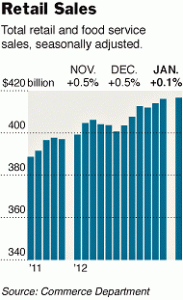New taxes and higher gas prices forced Americans to cut down on shopping and dining out in January, putting a damper on growth in retail sales across the country.
Retail sales were up only 0.1 percent in January, following stronger growth in December (0.5 percent) and November (0.4 percent).
Most analysts were anticipating the new tax package would hurt retail sales, and predicted the 0.1 percent growth. “January was a very special month because consumers knew they were going to have less income because they would have to pay higher taxes,” said Eugenio Aleman, a senior economist at Wells Fargo.
The tax increases passed as part of the fiscal package on January 1 and raises taxes on those making over $450,000. It also increased the Social Security tax from 4.2 to 6.2 percent on individuals making less than $113,700.
A two percent increase may not seem like much, but for an individual making $40,000 per year, that amounts to $800 they must now make do without.
Compounding the problem was higher fuel prices for January. Spending more for every gallon to get to work means families are forced to cut from elsewhere in their budgets.
And the numbers show they’re eating out less: food and drink service sales were flat in January as consumers reined in unnecessary expenses. “If you have to decide between driving to your work or eating at a restaurant, you go to work first,” said Aleman.
Neal Fried, a senior economist for the state of Alaska, agrees, “higher gas prices could have an affect that’s very immediate,” he said. But Fried thinks consumers will adjust to the new costs they now face, “they’ll get used to it; they’ll go back into their old habits of spending.”
Fried is optimistic that growth across the broader economy will nudge consumers back into those spending habits sooner rather than later. “If the American economy continues to recover, retail will be fine” he said.
And the American economy is recovering: Last year was the strongest year for housing starts, a measure of new homes, since the recession. The economy added 157,000 jobs in January. Revisions show employers added 181,000 jobs per month last year, up from an earlier estimate of 153,000. Last month, unemployment claims fell to a five-year low.
Even with the slowdown in January, the sustained gains in the jobs and housing markets are expected to buoy retail sales into the months ahead. “Even though we have a negative effect [on sales] from higher prices and higher taxes, there is a positive effect from new people coming into the workforce,” said Aleman, the Wells Fargo economist.
